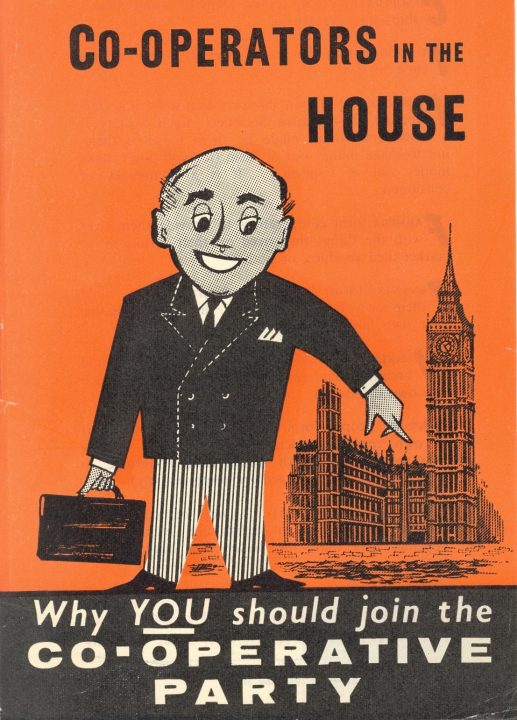As part of a regular monthly feature throughout the Co-operative College’s centenary year, archivist Sophie McCulloch explores interesting items from the past. This month she looks at some of the early records and marketing materials of the Co-operative Party – which demonstrate why it was set up in the first place…
Looking at the objectives of the Rochdale Pioneers, as set out in 1844, it may seem unusual that the co-operative movement eventually branched out into politics. One of their principles was to have political (and religious) neutrality as they wanted anyone to be able to join their society regardless of their political or religious beliefs. However, in later years, and as a reaction to the changing political climates, co-operators began to re-think this notion.
In 1881, the Co-operative Union (now Co-operatives UK) formed a parliamentary committee. This was in response to increasing government intervention in economic affairs which was affecting the radically growing co-operative movement. Its role was to act as a watchdog on any legislation which might affect the co-op movement. From its establishment in 1883, the Co-operative Women’s Guild was involved in numerous political campaigns.

The Co-operative Party itself was established in 1917. A resolution was passed at the Co-operative Congress of that year, the aim of which was to seek direct parliamentary and local government representation. The context of this was that co-operators felt they had been harshly treated throughout the First World War. This meant that despite the movement’s commitment to political neutrality, it was felt necessary that there was representation in Parliament. The first Co-operative MP was Alfred Waterson in Kettering.
An important landmark in the Party’s history was the 1927 Cheltenham Agreement. Made with the Labour Party, this was a formal recognition of the relationship between the co-operative movement and the Labour Party.
By the time of the outbreak of the Second World War, the Party had nine MPs and many representations on local administrative bodies.
In comparison to the First World War, with the outbreak of the Second World War in 1939 the movement had much greater representation in Parliament and could, therefore, have its voice heard in the debates on food supplies.
As the 20th century progressed, the co-operative movement took an active role in politics and political campaigns such as the anti-Apartheid protests in the 1960s, when some co-operative societies refused to sell goods from South Africa. After a dip in membership and representation in the 1980s, the Party saw a resurgence of interest in the 1990s when the movement as a whole re-discovered its ethical and radical roots.
Today, the Party continues to be active in many environmental and social campaigns.
The Co-operative Heritage Trust Archive holds the records of the Co-operative Party, with the catalogue accessible online through the Archive Hub: s.coop/23rdl

